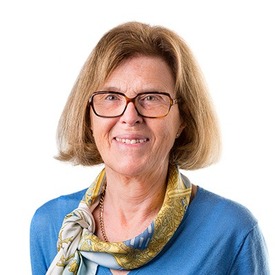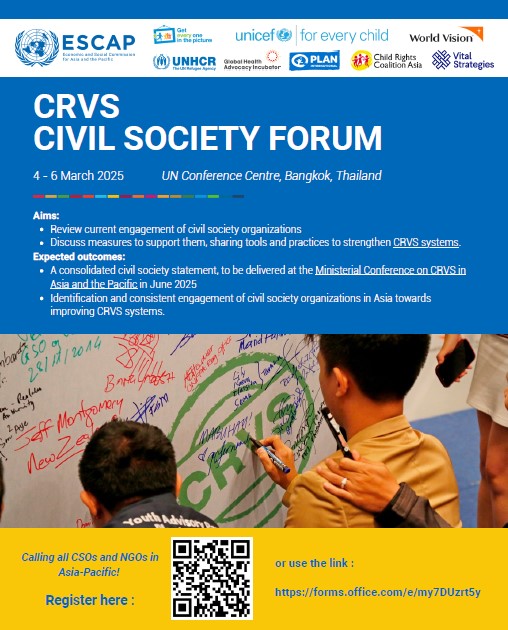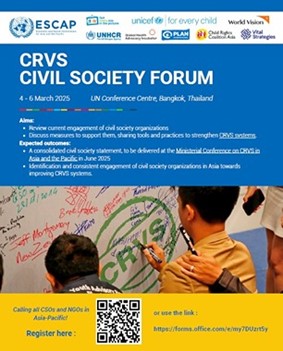(Newsletter: CRVS Insight July 2021)
Each month, our community newsletter puts a spotlight on one person from Asia-Pacific who has gone above and beyond in their efforts to support CRVS programmes, raise awareness of CRVS issues or lead CRVS improvement efforts in their home country. This month we are happy to highlight Ms.Carla AbouZahr.
What is your current (and maybe previous) title and role?
Currently, I am a consultant, working mainly with Vital Strategies, Bloomberg Data for Health Initiative, and with the World Health Organization (WHO). In fact I was a WHO staff member for over 20 years until retirement in 2011.
Can you please share with us a particular experience which highlighted the importance of CRVS to you?
My interest in CRVS systems started during my time at WHO when we were trying to estimate levels and trends in maternal mortality and realising how challenging that was for countries with weak CRVS systems. A maternal death is a family tragedy but thankfully it is a relatively rare event. Generally, there are far more deaths among babies (including stillbirths) and infants than among pregnant women. This means that while there are good methods for estimating infant and child mortality through household surveys, the same methods do not work as well for estimating maternal mortality. Maternal mortality estimates derived from sample surveys tend to have wide margins of uncertainty so it is difficult to be sure of the direction of trends and very hard to disaggregate by geographic area or by household income, as is commonly done for mortality in children. So it seems obvious that the solution is to count every maternal death and that leads directly to counting every death, which only a CRVS system can do. The continuous, permanent, compulsory and universal nature of civil registration mean that it generates vital statistics that are complete, detailed and ongoing. And of course, the civil registration of vital events has an important legal purpose also; the civil registration of a birth or a death is an acknowledgement that every individual matters. Every birth and every death should be counted in recognition of the inherent value of every life.
How are you currently involved in CRVS improvements?
With Vital Strategies I work with Bangladesh and Rwanda which are very different in terms of history and organization but which have both been eager to innovate and find new solutions – including digital solutions – to the administrative and organizational challenges of registering births and deaths. Both are making huge progress in improving their CRVS systems, including increasing birth and death registration and generating better quality information on causes of death. Most recently I have been collaborating with WHO to develop a guidance document describing how the health sector can be an active contributor to CRVS. After all, most births and deaths are known to health workers who can provide the information needed by the civil registrar and by the statistics office. They can also support families through the registration process and in obtaining copies of birth and death certificates. The potential to strengthen CRVS by closer collaboration with the health sector is yet to be fully harnessed in many countries.
How would you like to see CRVS in Asia and the Pacific develop by the end of the CRVS Decade?
This is a vast region with many countries and varied levels of performance of CRVS systems. There is always much to learn when countries are able to exchange ideas and look for solutions together. The networks of civil registrars have been really important vehicles for this sharing. The ESCAP partnership has helped move the agenda forward with its monitoring and reporting framework and the great website that contains a wealth of information and country experiences. In these COVID times, the ability to engage personally has been limited and although there is a lot that can be achieved on line, I think that many are looking forward to being able to meet and discuss challenges and solutions and to visit each other to learn how other countries have organised their CRVS systems. It is also important that development partners workin a harmonised way, with shared goals and a framework for the continued development of standards and guidance to meet country needs. Despite progress, there are big challenges remaining, such as grave inequities in access to birth and death registration, particularly among the poorest populations and those affected by conflict, crises and emergencies, such as refugees, displaced persons, and migrants. Addressing the needs of these millions of people for documentary evidence of identity, civil status and family relationships is essential to enable their inclusion in development and reduction in social and economic tensions.
What advice would you give to others trying to improve CRVS systems?
Think long term. Act now in a cross-sectoral, coordinated manner to develop solutions that are locally appropriate and sustainable for the future. The urgent need to be able to monitor deaths and causes of death has been magnified by the COVID pandemic. Civil registration systems and the statistics they generate must be strengthened as core components of the response to COVID-19. Building resilience into CRVS systems will be essential to enable them to better function during future health shocks. High-level, cross party, political leadership will be essential to develop the legal, governance and administrative systems that can maintain CRVS systems.












